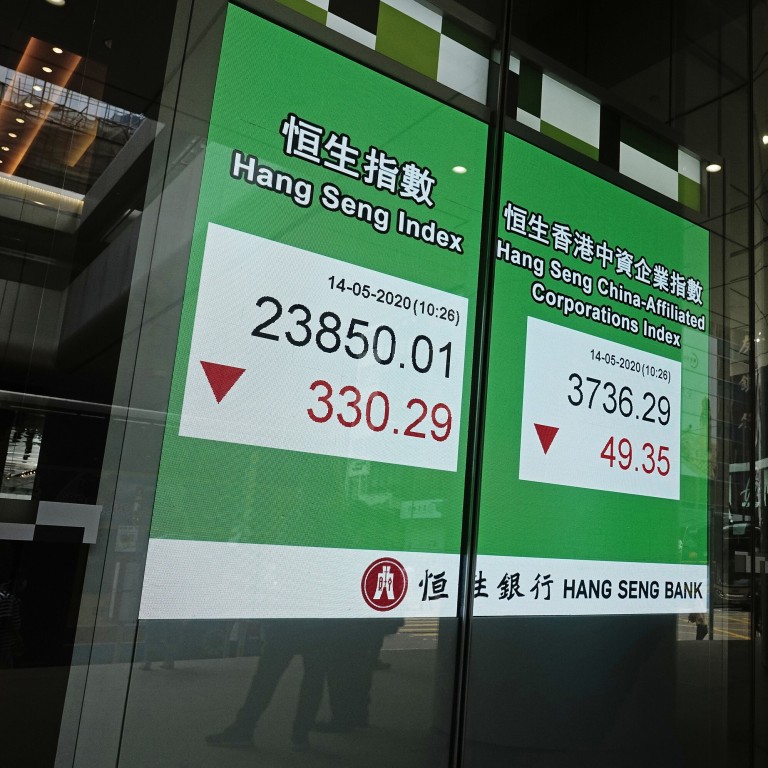
Hang Seng Index rebounds from rout as proposed security law roils sentiment, HKEX surges on Chinese IPO outlook
- Hang Seng Index posts a small gain, after losing as much as 1.8 per cent in a market roiled by proposed security law
- HKEX surges by the most in 18 months on optimism more Chinese companies will list in the city to escape Sino-US tensions
The Hang Seng Index rose 0.1 per cent, or 22.10 points, to 22,952.24 at the close, reversing an intraday loss of as much as 1.8 per cent. The Shanghai Composite Index added 0.2 per cent to 2,817.97, finishing higher for the first time in four days. Hong Kong Exchanges and Clearing (HKEX), the bourse operator, surged as more Chinese companies signalled plans to relist in the city amid Sino-US hostility.
The controversial security law heralds a rocky road for investors leading up to Hong Kong’s Legislative Council election in early September. The opposition bloc is seeking to win control of Legco for the first time since Hong Kong returned to Chinese rule in 1997, emboldened by a landslide victory in November’s district council elections.
“With more riots in the street amid the knockdown effects of Covid-19 and a possible exodus of jobs from the financial centre, surely things will get much worse” before they get better, said Stephen Innes, a strategist at AxiCorp.
In a mixed trading, HKEX rallied the most in 18 months, while Henderson Land Development and the city’s biggest property developers fell further on speculation social unrest will spur capital outflows and weaken asset prices.

04:52
Tear gas fired as thousands protest Beijing’s planned national security law for Hong Kong
The mild gains in Hong Kong and Shanghai contrasted with resilience in other markets in the Asia-Pacific region, as Japan is set to lift the emergency status in Tokyo and Hokkaido and schools reopened in Australia. The Nikkei 225 and the S&P/ASX 200 Index advanced by at least 1.7 per cent.
The unrest came hours after Vice-premier Han Zheng, Beijing’s top leader in charge of Hong Kong affairs, said the central government would implement the security law “till the end.”
US Senate’s bill to fence off Wall Street from Chinese companies may turn into a helping hand to Hong Kong stock exchange
HKEX surged 6.2 per cent to HK$275 for the biggest gain since November 2018. In Recent week, US-listed Chinese firms including JD.com and Baidu Inc have signalled their intention to raise capital in Hong Kong as US and China ramped up their hostility.
Meituan Dianping, China’s biggest online platform of bookings and food delivery firm, rose by 6 per cent to HK$125.80 before its first-quarter earnings report. It probably posted a net loss of 1.1 billion yuan (US$155.5 million), according to the estimates of analysts polled by Bloomberg.
Hong Kong developers remained unloved. A sub-index tracking the biggest developers on the Hang Seng Index retreated 0.8 per cent, adding to a 7.7 per cent slump on Friday. Henderson Land shed 2.7 per cent to HK$26.95 and CK Asset lost 2.5 per cent to HK$41.55.
In the mainland market, Fiberhome Telecommunication Technologies slumped 9.9 per cent to 29 yuan as a unit of the fibre cable maker was named on the entity list by the US on late Friday.

